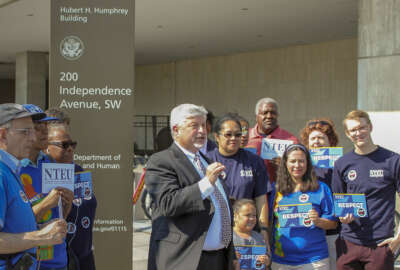
Fed unions taking victory laps
Unions representing federal and postal workers may be among the biggest winner in Tuesday’s midterm elections. Most went all out — though not exclusively ...
Unions representing federal and postal workers may be among the biggest winner in Tuesday’s midterm elections. Most went all out — though not exclusively — for Democratic candidates. In addition to political action committee funds and loaning personnel to campaigns, they energized members who, in many fed-heavy congressional districts, could supply the winning margins.
The trick is now to convince more Republican House members that faceless-bureaucrats are also taxpayers, real people and voters. Most of the recent proposals to gut the Federal Employees Retirement System and Civil Service Retirement System have come from House Republicans and/or the White House itself.
Equally important is to convince Democratic politicians, who will soon take over the House of Representatives, that federal workers, postal employees and retirees shouldn’t be taken for granted. The fed family needs action, not just an occasional good word or appearance at a union pep rally or protest. Although most unions supported the election and reelection of President Barack Obama, feds went without any pay raise in 2011, 2012 and 2013.
Outside of the heavily-unionized U.S. Postal Service, most federal civil servants don’t belong to or pay dues to a union, even if represented by one. For the past 50 years the national unions, with one exception, have supported mostly Democratic candidates for the presidency, House and Senate. Some also had ties, which they didn’t advertise, with key Republicans in states with lots of federal workers such as California, Texas, Maryland and Virginia.
That worked beautifully during the Clinton and Bush administrations, when both presidents tried to keep annual white collar federal pay raises well below those promised by the bipartisan Federal Employees Pay Comparability Act that took effect in 1990. When Clinton was in office House Democrats led by Steny Hoyer (D-Md.) moved to get feds bigger raises than the White House offered. When Bush took over House Republicans, led by Reps. Frank Wolf and Tom Davis of Virginia, formed a bipartisan coalition that produced bigger-than-proposed raises for government workers.
This time around the American Federation of Government Employees endorsed 372 candidates, most but not all of which were Democrats, at the national, state and local government levels in 48 states, Washington, D.C., and Puerto Rico. AFGE represents about 700,000 workers government-wide and is one of the largest unions in right-to-work states with large federal or military operations.
The National Treasury Employees Union also officially backed a record number of candidates from both political parties. NTEU has a large presence in the Homeland Security Department and IRS. The IRS, along with the Defense, Justice, Veterans Affairs departments and the Postal Service, is often the largest, or one of the biggest employers in congressional districts that host IRS service centers.
In a post-election statement, Ken Thomas, president of the National Active and Retired Federal Employees, noted there are feds “in every congressional district” and it is important for groups representing them to work with both political parties.
A special editor’s note of thanks here to Federal News Network’s Steff Thomas who slaved over a hot computer to confirm individuals endorsed by federal unions.
The Senate in recent years has rarely joined in the fed-bashing and swamp-draining threats to the bureaucracy. The body even approved a 1.9 percent federal pay raise for 2019 that must be cleared by the House. Proposals to eliminate cost of living adjustments for retirees and force workers to pay more for their retirement package have also originated in the House.
Changes coming in appropriations, budget and government affairs committee leadership next year may mean fewer threats to civil service pay or benefits. And sometimes “forgetful” Democratic politicians may be reminded to acknowledge who helped put them back in the majority.
Nearly Useless Factoid
By Amelia Brust
Englishman Bobby Leach survived going over Niagara Falls in a barrel in 1911, but died in 1926 after slipping on part of an orange peel. He injured his leg, which became infected with gangrene and eventually killed him.
Source: BBC
Copyright © 2024 Federal News Network. All rights reserved. This website is not intended for users located within the European Economic Area.
Mike Causey is senior correspondent for Federal News Network and writes his daily Federal Report column on federal employees’ pay, benefits and retirement.
Follow @mcauseyWFED
Related Stories





